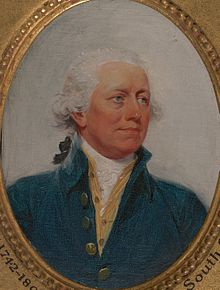Ralph Izard
| Ralph Izard | |
|---|---|

Ralph Izard 1793, by John Trumbull, American, 1756–1843
|
|
| President pro tempore of the United States Senate | |
|
In office May 31, 1794 – November 9, 1794 |
|
| Preceded by | John Langdon |
| Succeeded by | Henry Tazewell |
|
United States Senator from South Carolina |
|
|
In office March 4, 1789 – March 4, 1795 |
|
| Preceded by | Position established |
| Succeeded by | Jacob Read |
| Delegate from South Carolina to the Congress of the Confederation | |
|
In office November 4, 1782 – November 1, 1783 |
|
| Personal details | |
| Born | January 23, 1741 / 1742 near Charleston, South Carolina |
| Died | May 30, 1804 (aged 62–63) near Charleston, South Carolina |
| Political party | Pro-Administration |
| Spouse(s) | Alice DeLancey |
| Children |
Ralph Izard George Izard |
| Alma mater | Trinity Hall, Cambridge |
| Profession | Planter |
| Religion | Episcopalian |
| Signature | |
Ralph Izard (January 23, 1741/1742 – May 30, 1804) was a U.S. politician. He served as President pro tempore of the United States Senate in 1794.
Izard was born at "The Elms" near Charleston, South Carolina. He was the son of Henry Izard and Margaret Johnson. His great-grandfather was Ralph Izard (1660–1710), who was born in Dorchester, England and settled in South Carolina. His maternal grandfather was Province of South Carolina Governor Robert Johnson. Izard's parents died when he was a small child, and only one of his siblings survived to adulthood. He spent most of his childhood and youth studying in England: he attended a school in Hackney, London, and matriculated as a fellow-commoner at Trinity Hall, Cambridge. Izard returned to America in 1764, but did not remain in South Carolina for long.
In 1767, Izard married his niece Alice De Lancey, who was a niece of James DeLancey and a descendant of Stephanus Van Cortlandt and Gertrude Schuyler. Izard and his wife had fourteen children together, but only seven survived past early childhood. His most notable children were George Izard and Ralph Izard (naval officer). After Izard moved to America in 1780 to focus on his work towards the American Revolution, his family stayed in France until 1783 when they joined him in South Carolina.
He resided in London in 1771 and moved to Paris, France, in 1776. He was appointed commissioner to the Court of Tuscany by the Continental Congress in 1776, but was recalled in 1779. He returned to America in 1780 and pledged his large estate in South Carolina for the payment of war ships to be used in the American Revolutionary War. He was a member of the Continental Congress in 1782 and 1783. In 1788, he was elected to the United States Senate and served from March 4, 1789, to March 4, 1795, serving as President pro tempore of the Senate during the Third Congress.
...
Wikipedia
